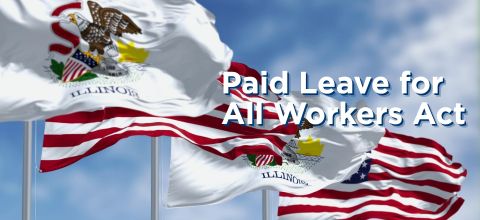Illinois' Paid Leave for All Workers Act

On January 1, 2024, Illinois’ “Paid Leave for All Workers Act” (PLAWA) went into effect. This law is applicable for most employers in Illinois. (There are certain categories of workers that are not subject to the law, and the law does not apply to employers in the City of Chicago or in Cook County, as those areas have both already adapted their own Paid Leave policies.)
We cover highlights of the PLAWA in this article, but the Act is complex and we highly encourage all employers in Illinois to read through the full list of FAQs provided by the IL Department of Labor, found at: https://labor.illinois.gov/faqs/paidleavefaq.html. The Department of Labor has also said that they are in the process of preparing guidance and other resources and materials to educate employees and assist employers with compliance.
If you need to update your paid leave policy to be in compliance with the PLAWA, be sure to do that as soon as possible. Remember to then have your Office Policy/Handbook updated with any changes, and be sure to provide these updates to your staff. Employees are allowed to file complaints if they feel their employer is not being compliant with the Act.
Overview of the PLAWA
Under the Act, employees can earn at least 1 hour of paid time off for every 40 hours worked, up to 40 hours in a 12-month period. Employers can also frontload paid leave by providing all paid leave time at the beginning of the year. Either method is allowed, so long as employees can earn and use up to 40 hours of paid leave per year. However, be aware that if an employee leaves their employment before the end of the year or works fewer hours than anticipated by their employer, the employer may not diminish or recoup used or unused frontloaded paid leave benefits.
PLAWA went into effect on January 1, 2024. Accrual of paid leave begins upon the start of employment or January 1, 2024, whichever is later. Employees are entitled to begin using the accrued paid leave after 90 days. If an employee begins accruing paid leave on January 1, 2024, the first day they could take that paid time off would have been March 31, 2024.
Example 1: Employee A has worked for their employer since 2019, but did not previously get any paid time off. Employee A began accruing paid time off beginning January 1, 2024 (the effective date of the Act), and was entitled to begin taking their leave on March 31, 2024.
Example 2: Employee B starts a new job on July 1, 2024, and works 40 hours per week. They start accruing paid leave on their first day (July 1), but must wait 90 days (until September 29, 2024) before taking any of their accrued paid leave.
Example 2: Employee B starts a new job on July 1, 2024, and works 40 hours per week. They start accruing paid leave on their first day (July 1), but must wait 90 days (until September 29, 2024) before taking any of their accrued paid leave.
Other Details of PLAWA
- The Act applies to employers of all sizes, and includes non-profits and religious organizations.
- PLAWA applies to all employees so long as they meet the definition under the Act. It does not matter if the employee works full-time, part-time, seasonal, through a temp agency, or on-call.
- Employees should receive their regular hourly rate for their paid leave time.
- Generally speaking, PTO is leave that can be taken for any reason or no reason at all. Under PLAWA, an employer cannot ask an employee the reason for their paid leave request. Additionally, an employer cannot ask an employee for documentation relating to their paid leave request.
- Employers can adopt a reasonable policy that outlines the reasons they can deny paid leave requests due to operational necessity. This includes “blackout dates” for particularly busy periods, such as holidays and peak seasons. This paid leave policy should be applied equally, and clearly communicated to all employees in writing.
If the Employer already has a Paid Leave policy
If an employer already provides their employees with at least 40 hours of paid leave per year that employees can use for any reason of their choosing, then an employer does not need to provide employees with additional paid leave time or modify their existing policy. This isn’t because the employer is exempt from the law, but that their paid leave policy is likely already in compliance with PLAWA.
